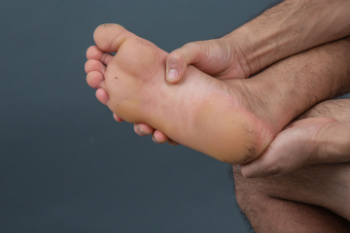
Cracked heels, also known as fissures, are a common foot condition where the skin on the heels becomes dry, thickened, and eventually splits. These cracks can be painful and, in severe cases, may lead to infection. The primary causes of cracked heels include dry skin, prolonged standing, excessive pressure on the feet, and wearing open-back shoes. To find relief, it is important to keep the feet moisturized with thick creams or ointments that help heal and hydrate the skin. Regular exfoliation with a pumice stone can remove dead skin and prevent the buildup that leads to cracks. Wearing comfortable, supportive shoes with proper cushioning can also reduce pressure on the heels. If you have developed persistent cracked heels, it is suggested that you consult a podiatrist who can offer prescribed medication for effective relief and treatment.
Cracked heels are unsightly and can cause further damage to your shoes and feet. If you have any concerns, contact Joe Mathew George DPM, FACFAS from Illinois. Our doctor can provide the care you need to keep you pain-free and on your feet.
Cracked Heels
Cracked heels appear unappealing and can make it harder for you walk around in sandals. Aside from looking unpleasant, cracked heels can also tear stockings, socks, and wear out your shoes. There are several methods to help restore a cracked heel and prevent further damage.
How Do You Get Them?
Dry skin is the number one culprit in creating cracked heels. Many athletes, walkers, joggers, and even swimmers suffer from cracked heels. Age and skin oil production play a role to getting cracked heels as well.
Promote Healing
Over the counter medicines can help, especially for those that need instant relief or who suffer from chronic dry feet.
Wear Socks – Wearing socks with medicated creams helps lock in moisture.
Moisturizers – Applying both day and night will help alleviate dryness which causes cracking.
Pumice Stones – These exfoliate and remove dead skin, which allows for smoother moisturizer application and better absorption into the skin.
Change in Diet
Eating healthy with a well-balanced diet will give the skin a fresh and radiant look. Your body responds to the kinds of food you ingest. Omega-3 fatty acids and zinc supplements can also revitalize skin tissue.
Most importantly, seek professional help if unsure how to proceed in treating cracked heels. A podiatrist will help you with any questions or information needed.
If you have any questions, please feel free to contact our offices located in Joliet, Bolingbrook, and Channahon, IL . We offer the newest diagnostic and treatment technologies for all your foot care needs.
